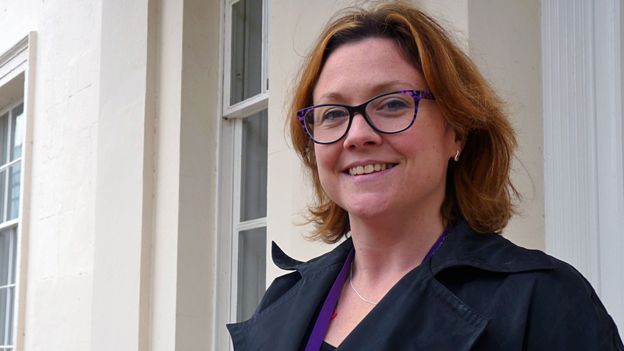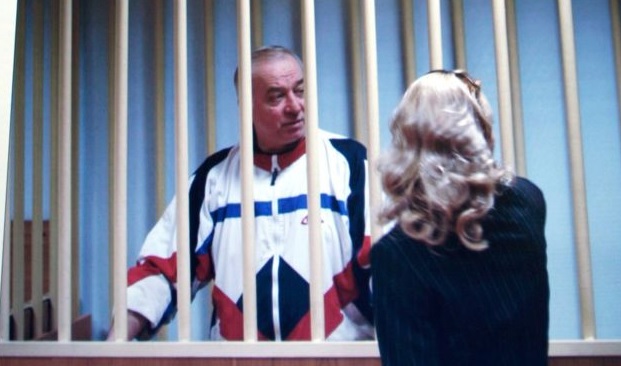At the age of 12, Sarah Thomas found out that her father – who she’d never known – was a Roman Catholic priest. She then spent years trying to establish a relationship with him. It took a near-death experience for her to overcome the scars of his rejection.
Sarah Thomas was brought up by her mother in a housing association flat with a flower-filled balcony on an estate in south-east London. Although they were hard-up, Sarah remembers it as a happy childhood, punctuated by birthdays, Christmases and church on Sundays.
But as she grew older Sarah began to notice that her family was different. Everyone else she knew spent time with their fathers even if their parents were divorced, so why didn’t she? She didn’t even know who her father was.
Her mother eventually told Sarah that he was a university lecturer
“But I just had a feeling that there was something I wasn’t being told. Why was it all such a big secret?” Sarah says.
In 1990, when Sarah was 12, her mother finally told her the truth. Her father wasn’t a lecturer – he was a Roman Catholic priest, living and working in London.
“I just said, ‘That’s fantastic! I’m sure he’d like to meet me,'” Sarah says.
Her mother wasn’t so sure.
Sarah’s parents met while they were both mature students in 1970s London. They had been together for about two years when, at the age of 34, Sarah’s mother fell pregnant.
“She was definitely in love with him and she thought he loved her,” Sarah says.
Her mother hoped that her lover would give up his studies and marry her. She was living in a student flat with two friends who were also dating trainee priests, and at least one of the men had decided love took priority over the priesthood.
But Sarah’s father was horrified when he found out about the pregnancy. He ended the relationship that day and never spoke to Sarah’s mother again on his own – only in the presence of another representative of the church.
A senior priest suggested to Sarah’s mother that she go away to stay by the sea until the baby arrived and then give it up for adoption, but Sarah’s mother refused.
“So this priest decided that my father could carry on and become a priest,” Sarah says, “as long as my mother and the child – me – were in cahoots with their plan of secrecy.”
This is why Sarah was told nothing about her father as she was growing up. Later Sarah learned that he had occasionally sent her mother money.
“But the money was often accompanied by letters reinforcing the need for secrecy, saying things like, ‘If you ever talk about this or identify him as the father then the money will stop.'”
Once Sarah had expressed a wish to meet her father, though, her mother started writing to him to persuade him to agree. And two years later, he did.
“In my naivety, from watching chat shows where people who haven’t ever met run towards each other and start crying and then they’re friends for ever and ever – that’s how my friends and I had thought it would be,” Sarah remembers.
She was excited about the meeting and wore her favourite turquoise and white tie-dye jeans from Camden Market.
“I will always remember them,” she says, “I felt so awkward, I spent a lot of time in the meeting just looking at my knees.”
Her father had brought a Catholic counsellor with him and Sarah, who was by now 14, was accompanied by the husband of one of her school teachers, an arrangement that completely failed to put her at ease.
“I’d grown up without a father-figure in my life so I wasn’t that comfortable with men and I didn’t really know how to react to them,” Sarah says. “I could hardly speak due to nerves, all the questions I’d been planning to ask evaporated.”
She remembers her father’s eyes, which remained fixed on her throughout the meeting, his casual clothes which didn’t look at all priestly, his short grey hair.
“I went in there thinking we were going to be best friends, but he was very aloof and cold,” she remembers.
The last thing Sarah’s father said to her that day was that he wouldn’t be able to see her again for four years.
“Before we’d met I’d thought, ‘Well, of course, he’ll love me,'” she says. “So when he did meet me and the outcome was that we still weren’t going to have any kind of relationship, that really hurt.”

Sarah’s father is in his 70s now. They no longer meet. Sarah writes to him occasionally and he sends money for her children’s birthdays but she doesn’t hold out any hope that the situation between them will improve.
“When someone consistently puts their own needs before yours – their child – you’re always wondering if you’re going to get hurt again.”
But coming close to death gave Sarah a new perspective on her relationship with her father.
“Being conscious and very much alert and awake away from my body after my accident confirmed to me that we do go on,” Sarah says.
“I’m not religious, but maybe one day, after we both die, maybe then we’ll be closer. Who knows?”
NEWS SOURCE : BBC STORIES .
 Weblifedata News and Magazine
Weblifedata News and Magazine




